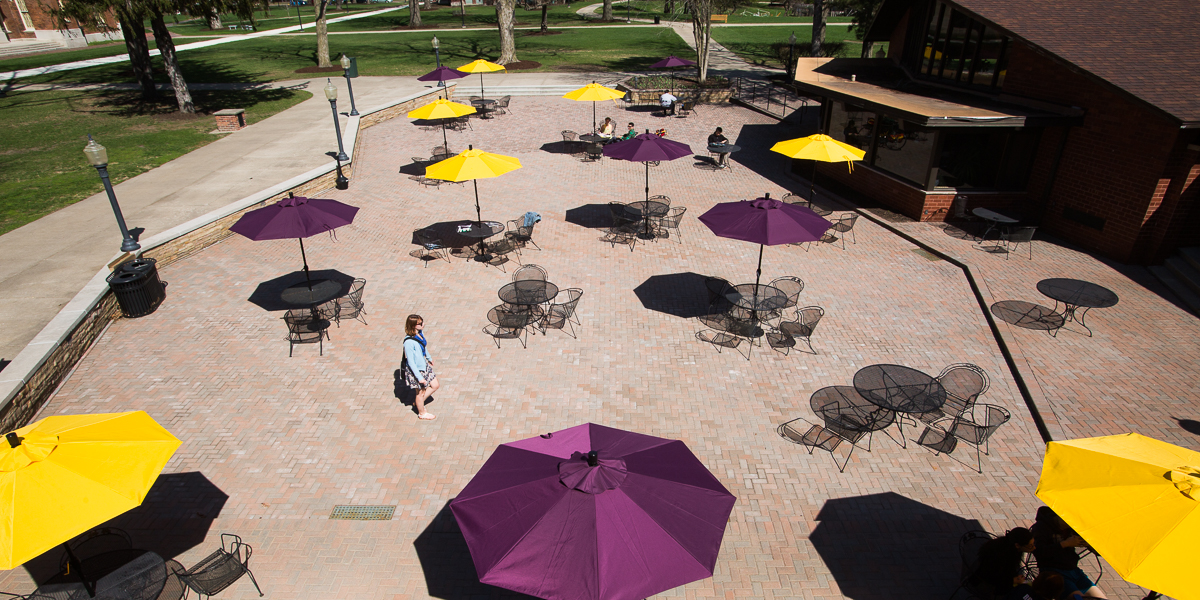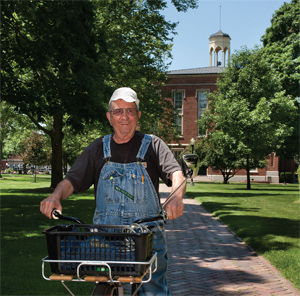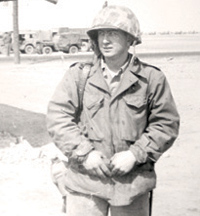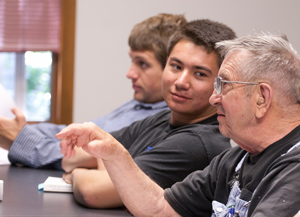


Not Your Traditional Non-Traditional Student
Text and Photos By Peter Bailey
 Child of the Great Depression, teenager during World War II, U.S Marine in the Korean War, factory worker in the post-war boom, then a Rust Belt retiree. George Bacon has experienced much of what is studied in 20th-century American history. This past year at Knox College, he continued with the one experience that he ignored for most of his 80 years -- and it wasn't just "going to college" -- although Bacon is doing that. He is discovering and exploring the life of the mind.
Child of the Great Depression, teenager during World War II, U.S Marine in the Korean War, factory worker in the post-war boom, then a Rust Belt retiree. George Bacon has experienced much of what is studied in 20th-century American history. This past year at Knox College, he continued with the one experience that he ignored for most of his 80 years -- and it wasn't just "going to college" -- although Bacon is doing that. He is discovering and exploring the life of the mind.
Bacon's age, background, and education tag him as a non-traditional student, sharing little with his 18-to-21-year-old classmates. But his thirst for knowledge, enthusiasm in class, and idealistic view of education reveal a liberal arts student in the fullest sense of the term.
When Bacon began at Knox in September 2011, he was, at 79, the oldest degree-seeking student of record in the modern history of the College. He was already the oldest graduate in the history of Carl Sandburg College in Galesburg, where he completed an associate's degree in 2010.
"I was out of school for 50 years. That's why it took so long [at Carl Sandburg College] -- 10 years -- one or two classes a semester," Bacon said, shortly after he enrolled at Knox.
When Bacon eagerly took part in new student orientation last September, it was not his first experience with Knox. In the 1940s and '50s, his mother cooked for the Phi Delta Theta fraternity house -- then located several blocks north of campus.
"I knew Knox was here, but it never flipped my dipper, never turned a light bulb on. School wasn't very interesting to me. I was more interested in the shop classes. I was busy playing baseball or carrying papers. I delivered The Register-Mail on my bicycle, up and down Bateman Street, from Losey to Fremont. I'd fold those things and ‘schoom,' right through the screen door!"
During the 1940s, a paper route provided more than pocket change and fun for a kid with a bike. "I remember one time [my parents] were going to send a letter, and they didn't have three cents for a stamp. They borrowed it from me, because I made $2.50 a week delivering papers."
 |
|
Although George Bacon was a My Korean Brother |
He graduated from Galesburg High School in 1953, joined the U.S. Marines, saw combat in Korea, then returned to Galesburg and got a factory job. "Jobs were readily available around this area. And a high school diploma was all you needed."
Bacon did factory work until retiring again in 1997. "When I retired, my wife and I built a new house, and I did most of the wiring." After finishing the house, Bacon said, he enrolled at Carl Sandburg College to learn more about electricity. "I wanted to find out why I did what I did."
He continued to take courses, first in mechanical subjects, then in history and literature but still with a practical focus -- becoming a better conversationalist. "All my life I worked with my hands, sometimes 10 hours a day, doing the same thing. If all I know is how to fix a piece of equipment, I'm not very good to talk to, unless that's all somebody wants to talk about."
Bacon was challenged by Sandburg's prerequisites. "I had to take the lowest math courses and work my way up. When I tried to sign up for freshman composition, the instructor had me write a paragraph. When he looked at that summbitch, he said ‘nooo . . .' I had to take the lowest English class, to work my way up to freshman composition."
When Bacon entered Knox this past fall, he found the academics challenging again. "These classes are hard for me. Sometimes I can't understand it the first time, and sometimes not the second time. The students understand the material, they just absorb like a sponge. Me, I have to drive it in," he said, hitting his head with his hand.
There are other contrasts. Sitting on the Gizmo patio this spring, he declared in his shoot-from-the-hip style: "I don't think I fit in with the crowd. They're all young, right out of high school. Their fathers could be my grandkids. Just look at what they're wearing, and look at me. How many of them are wearing bib overalls?"
Bacon and his wife, Sheryl, live in Galesburg, and he often commutes to class on his bicycle. He has a part-time job at the Sears store, family in town, and tinkers with bikes. What students find lively-the spontaneity of campus life-Bacon often finds frustrating. "Students don't plan things the way I do," he said. "They say things like ‘We're doing it later today,' or, ‘We're doing it tonight.' When I do something, I gotta know in advance. I've got a wife at home, and before I make plans, I have to ask first."
The big picture shows more. "I see him talking to students all the time," said Michelle Gerber '11, who met Bacon in Galesburg before he enrolled at Knox. "He's lively and engaging and interested in young people. He's excited about continuing his education, about sharing his knowledge with other students. He doesn't see education as a one-way street. It's a dialogue where you learn from each other."
Outside of class, Bacon joined study groups, including one formed at his own urging. "In environmental studies, I didn't understand what to write in the paper. I asked the instructor [Visiting Assistant Professor Nic Mink], and we met in the library." Other students showed up with their own questions about the assignment.
Knox's Non-Traditional Students Club threw a party for him in the Gizmo last February when he turned 80. And Bacon has connected with faculty, including his advisor, Konrad Hamilton, associate professor of history and chair of the American Studies program.
"I really like Konrad Hamilton," Bacon said, who also has taken a course with him. "He comes to class dressed like a professor" in jacket and tie. "I've seen professors in flip-flops," Bacon complained. "I believe they gotta set an example."
 "I enjoy the class participation," Bacon said of the course he took with Hamilton. "Everybody gets to say something."
"I enjoy the class participation," Bacon said of the course he took with Hamilton. "Everybody gets to say something."
Prior to college, discussion was not a big part of Bacon's work day. "In the factory, you go into the shop, and you get your tools out. The foreman might come in and give you the plans, and then he walks away." Now, everything is open for questions, and Bacon is not afraid to speak out. "I don't always agree with what's in the book. I don't always agree with what the professors say. If it's in my lifetime, I've got 80 years of experience. In some history classes, what they're reading in books, I've lived."
Jon Wagner, professor of anthropology, said that Bacon brought an extra dimension to his Native America course. "George gave a special invited presentation based on his term paper research about post-traumatic stress disorder in Native communities, offering insights through comparisons with his own experience after Korea."
Often coming to the classroom early, to review his notes, Bacon is not afraid to look like an eager student. "I always sit right up front," he said "I'm a tad hard of hearing, so I have to concentrate on the professor." Another of his professors, Lane Sunderland, Chancie Ferris Booth Professor of Political Science, noticed Bacon's enthusiasm in American Political Thought. "He was eager to learn. And it's always nice to have the voice of experience."
On the last day of spring term, as he prepared for the final exam in Sunderland's class, Bacon talked about his own favorite American political thinker.
"Franklin Roosevelt," he declared without hesitation. "When Roosevelt became president, this country was almost buried. Whatever the administration was trying to do, to break out of the Depression, wasn't working. So he tried other things. Roosevelt was criticized by the people who had money, when he said he'd take some away to give to somebody else at the bottom of the ladder. But it worked."
Disagree if you want, but Bacon is talking about what he has lived, and now, what he has studied in class.
"I think the more I know, the better person I am," Bacon said. It is a view consistent with the ancient but now seemingly quaint view of the liberal arts as education for citizenship, rather than career. "I'm not looking for a job. All I did for 46 years was work," Bacon said. He also has grown beyond one of his own goals, that of being a better conversationalist. Now it's the sheer joy of learning.
"As education came to me, it got more and more interesting," Bacon said. "I'm discovering that there's a whole different world out there that I didn't know about. I didn't know what was on the other side of the hill. There's so much out there that's interesting. I want to learn about everything. I think it gives me a bigger horizon that I can see. I'm really enjoying going to school."
Editor's Note:
We are sad to report that George Bacon unexpectedly passed away on Saturday, June 30, 2012, while this magazine was still in production. George may have been a member of the Knox community for only a year, but he greatly impacted those faculty, staff, and students whom he met, and his love of learning was infectious.